How RO Plants treat produced water in Oil and Gas Industries?
The oil and gas industry faces significant challenges in managing and treating produced water, which is the water that comes to the surface during oil and gas extraction. This water often contains high levels of contaminants, making it unsuitable for immediate discharge or reuse. Reverse osmosis (RO) has emerged as a valuable technology for produced water treatment and reuse in the oil and gas industry. This blog post explores the role of reverse osmosis in treating produced water, highlighting its potential for sustainable water management practices.
1. Treatment of Produced Water:
Produced water typically contains hydrocarbons, salts, heavy metals, and other contaminants that require effective treatment before disposal or reuse. Reverse osmosis offers several advantages in treating produced water:
a) Contaminant Removal: Reverse osmosis utilizes a semi-permeable membrane to separate dissolved salts, organic compounds, and suspended solids from the water. The high rejection capabilities of RO membranes allow for the removal of a wide range of contaminants, resulting in treated water that meets the required quality standards.
b) Reduction in Disposal Costs: Treating produced water with reverse osmosis can significantly reduce disposal costs associated with transporting and disposing of large volumes of contaminated water. By removing contaminants, RO produces a concentrated brine stream that requires smaller disposal volumes.
c) Compliance with Regulations: Regulatory agencies impose strict guidelines for the treatment and disposal of produced water. Reverse osmosis enables oil and gas companies to comply with these regulations by effectively treating the water and ensuring compliance with discharge limits.
2. Water Reuse and Conservation:
In addition to treating produced water for disposal, reverse osmosis can facilitate its reuse, providing several benefits for the oil and gas industry:
a) Water Conservation: Water scarcity is a growing concern worldwide, and the oil and gas industry is a significant consumer of freshwater resources. By treating produced water through reverse osmosis, the industry can conserve freshwater resources by reusing the treated water for various purposes, such as irrigation, hydraulic fracturing, or even boiler feed water.
b) Cost Savings: Reusing treated produced water can result in substantial cost savings compared to sourcing freshwater for various operations. By implementing reverse osmosis systems, oil and gas companies can reduce their dependence on freshwater sources and mitigate the costs associated with water procurement.
c) Environmental Benefits: Reusing treated produced water reduces the need for freshwater extraction, thereby minimizing the environmental impact associated with freshwater depletion. It also reduces the demand for discharging treated water into the environment, helping to protect local ecosystems.
3. Operational Efficiency:
Reverse osmosis systems offer operational benefits for the oil and gas industry:
a) Scalability: Reverse osmosis systems can be designed to handle varying flow rates and water quality characteristics, making them suitable for both small-scale and large-scale operations. This scalability allows for flexibility in treating produced water from different oil and gas extraction processes.
b) Pre-treatment Optimization: Pre-treatment processes, such as filtration or chemical dosing, can be integrated with reverse osmosis systems to optimize performance and enhance the lifespan of RO membranes. Customized pre-treatment strategies based on specific water composition can improve the overall efficiency of the produced water treatment process.
c) Monitoring and Control: Advanced monitoring and control systems can be implemented in reverse osmosis systems to ensure optimal performance, minimize downtime, and maximize the longevity of membranes. Real-time monitoring of operational parameters enables proactive maintenance and troubleshooting, leading to improved efficiency and cost-effectiveness.
Conclusion:
Reverse osmosis plays a crucial role in the treatment and reuse of produced water in the oil and gas industry. By effectively removing contaminants and producing high-quality treated water, RO enables compliance with regulations, reduces disposal costs, and promotes sustainable water management practices. The ability to reuse treated produced water offers significant benefits in terms of water conservation, cost savings, and environmental stewardship. As the industry continues to prioritize sustainable practices, reverse osmosis will remain a valuable tool in addressing the challenges of produced water treatment and reuse in the oil and gas sector.
Netsol Water is Greater Noida-based leading water & wastewater treatment plant manufacturer. We are industry's most demanding company based on client review and work quality. We are known as best commercial RO plant manufacturers, industrial RO plant manufacturer, sewage treatment plant manufacturer, Water Softener Plant Manufacturers and effluent treatment plant manufacturers. Apart from this 24x7 customer support is our USP. Call on +91-9650608473, or write us at enquiry@netsolwater.com for any support, inquiry or product-purchase related query.



